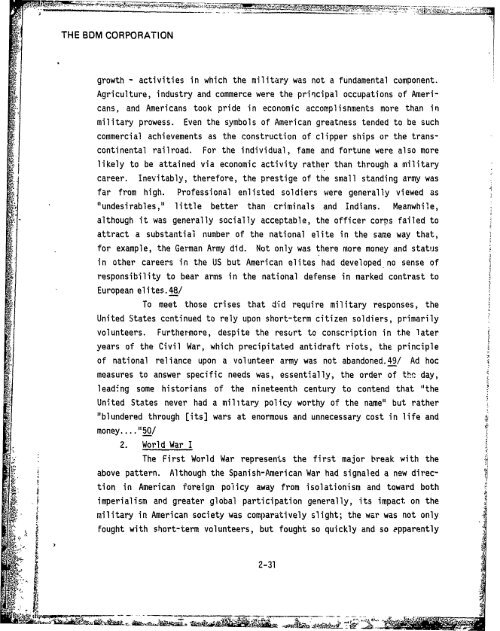policy - The Black Vault
policy - The Black Vault
policy - The Black Vault
You also want an ePaper? Increase the reach of your titles
YUMPU automatically turns print PDFs into web optimized ePapers that Google loves.
THE BDM CORPORATION<br />
growth - activities in which the military was not a fundamental component.<br />
Agriculture, industry and commerce were the principal occupations of Americans,<br />
and Americans took pride in economic accomplisnments more than in<br />
military prowess. Even the symbols of American greatness tended to be such<br />
commercial achievements as the construction of clipper ships or the transcontinental<br />
railroad. For the individual, fame and fortune were also more<br />
likely to be attained via economic activity rather than through a military<br />
career. Inevitably, therefore, the prestige of the small standing army was<br />
far from high. Professional enlisted soldiers were generally viewed as<br />
"undesirables," little better than criminals and Indians. Meanwhile,<br />
"although it was generally socially acceptable, the officer corps failed to<br />
attract a substantial number of the national elite in the same way that,<br />
for example, the German Army did. Not only was there more money and status<br />
in other careers in the US but American elites had developed no sense of<br />
responsibility to bear arms in the national defense in marked contrast to<br />
European elites.48/<br />
To meet those crises that did require military responses, the<br />
United States continued to rely upon short-term citizen soldiers, primarily<br />
volunteers. Furthermore, despite the resurt to conscription in the later<br />
years of the Civil War, which precipitated antidraft riots, the principle<br />
of national reliance upon a volunteer army was not abandoned.49/ Ad hoc<br />
measures to answer specific needs was, essentially, the order of the day,<br />
leading some historians of the nineteenth century to contend that "the<br />
United States never had a military <strong>policy</strong> worthy of the name" but rather<br />
"blundered through [its] wars at enormous and unnecessary cost in life and<br />
money.... "50/<br />
2. World War I<br />
mny..<strong>The</strong> First World War represents the first major break with the<br />
above pattern. Although the Spanish-American War had signaled a new direction<br />
in American foreign <strong>policy</strong> away from isolationism and toward both<br />
imperialism and greater global participation generally, its impact on the<br />
_ I military in American society was comparatively slight; the war was not only<br />
fought with short-term volunteers, but fought so quickly and so epparently<br />
2-31<br />
ffig .ý
















